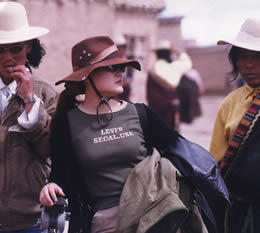In 2010, Tel Aviv-based Chinese writer Tang Danhong and Tibetan writer Sangjey Kep traveled to India to collect oral histories from elderly Tibetan exiles who had fled Tibet as the People’s Liberation Army entered and tightened control of the region in 1950. Some of the interviewees had joined the armed rebellion against Chinese forces before fleeing Tibet and making the arduous journey on foot to India. Tang originally posted the interviews in Chinese on her blog, and has now published them in a book titled, “Troubled Times: Voices of Tibetan Refugees.” In 2014, CDT translated four of the 11 interviews into English. Tibetan writer Woeser, who is a close friend of Tang’s, wrote the introduction to the book, which has now been translated by High Peaks, Pure Earth in two parts. In Part 1, she discusses the importance of recording this history now:
The eyewitness testimonies uttered in Tibetan by the 11 interviewees were all translated into Chinese so as to resist against the amnesia that the dominant power has been forcing upon the people and to provide truthful and effective accounts of the “upheaval” that Tibet was put through during the past half a century.
[…] Let’s take a look at the more than 20 questions that Danhong and Sangjey asked the interviewees. For instance, could you tell us some of your impressions of your hometown? Did you know your local headman? At the time, did you know about Chinese people and Chinese areas? Did you know that Tibet and China belonged to one and the same country? What were your impressions of the Chinese soldiers and cadres that came to your hometown? How did your relatives and fellow villagers discuss the arrival of the Chinese? Did you communicate with the Chinese? Did you have Chinese friends? Why did you decide to flee (or participate in resistance)? After deciding to follow resistance movements, did you feel that there was any hope to win? What incident left the deepest impression on you during your escape (or resistance)? What was the most painful experience in your life? The Chinese government labels you “rebel bandits”, do you feel that you were “rebel bandits”? And many more.
Danhong and Sangjey Kep did something that had been crying to be done. And it should also be done by the descendents of those who lived through these times of upheaval; it should also be done in every village, every tribe, every county, every district and every monastery. We must interview, record, photograph and tape everything; we must collectively remember and return an already lost Tibet, we must collectively reflect on how we ended up where we are today and think of the road that is ahead of us. In this way, eyewitness testimonies are not just a matter of 11 people, but of all six million Tibetans (what we like to call “Saya Druk”), including many compatriots who lost their lives and those who survived and those who were reborn and returned. This is exactly why eyewitness testimonials are so important and so urgent. [Source]
In Part 2 of the introduction, Woeser discusses her friendship with Tang and her own personal history as the daughter of a former PLA officer in Tibet:
[Danhong and I] have so much in common; not only age, poetry and art; not only Sichuan dialect and not only our deep love for Tibet. My love comes from my flesh and bones–just as Danhong wrote in an email to me: “You love them because they are your family, I love them because of my mysterious connection with them…” But what unites us the most is our profound feeling of shame: She feels this shame because she is Chinese; I feel this shame because I am one-quarter Chinese and because my father was a PLA soldier. And because of this shame, we feel restless and even guilty. Because of this shame we want to make up for it through writing. [Source]
Tang Danhong previously wrote about her feelings toward Tibet as a Han Chinese in an essay titled “Tibet: Her Pain, My Shame,” which CDT translated in 2008.








